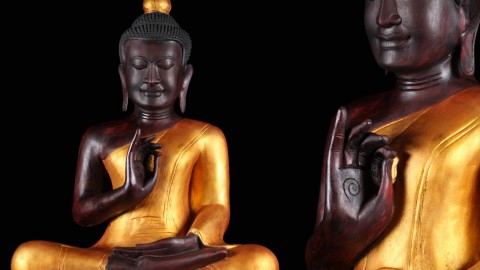There will be few question from Yoga Sutra 19
WHAT THE PSYCHOLOGY OF THE BUDDHAS? THERE HAVE BEEN THOUSANDS OF BUDDHAS IN THE EAST. HAD THEY NOT CREATED A PSYCHOLOGY OF THE ENLIGHTENED ONES? HAD NOT SAGES LIKE KAPIL, KANAD, BADARAYAN, PATANJALI, ETC., ESTABLISHED THE THIRD PSYCHOLOGY?
No, not yet. There are many problems. For the third psychology to be established the first two need to be completed. If you make a three storey house, the first two have to be completed, and only then can the third be raised. In the past, the psychology for the pathological man never existed, the first sort of psychology never existed. Nobody bothered to enter into the realm of mental disease, particularly not in the East. Nobody bothered because the disease could be gotten rid of without getting into it. There was no need to analyze it, there was no need to travel into the pathological mind, there was no need to do anything about it.
Certain techniques existed and still those techniques exist. You could simply cut it off.
For example, in Japan whenever there is a madman; somebody gone neurotic, they take him to the Zen monastery, they take him to the religious people of the town. This has been one of the oldest ways: take him to the religious man. And what is done in the monastery? – nothing. In fact, nothing is done. When a madman is brought to the monastery, they don’t bother to analyze, diagnose.
They don’t bother to think about what type of disease this is. There is no need because the disease can be dropped. They put the madman into an isolated room far away from the monastery, just in the corner, at the back. His needs are fulfilled: food is given and whatsoever he needs, but nobody talks about him, nobody pays any attention to his madness. The East knows that the more you pay attention to it, the more you feed the madness. The whole monastery remains indifferent, as if nobody has come in.
Indifference is one of the techniques, because a madman really needs much attention. It may be that he became mad just to get attention. That’s why psychoanalysis cannot be of much help, because the psychoanalyst gives so much attention to the mad, the neurotic, the psychotic, that he starts thriving on that attention: for years together somebody is paying attention to you.
You must have observed that neurotic people always force others to be attentive towards them. They will do anything if they can get the attention. In a Zen monastery they don’t give any attention, they remain indifferent. Nobody bothers and nobody thinks that he is mad, because if the whole group thinks that he is mad that thinking creates vibrations that help the madman to remain mad.
For three weeks, four weeks, the mad man is allowed to be with himself. Needs are fulfilled but no attention is given, no special attention; indifference is maintained. Nobody thinks that he is mad. And within three or four weeks, the madman, remaining with himself, by and by gets better. The madness subsides.
Even now they do the same in Zen monasteries. Western psychologists have become aware of the fact. Many have gone to Japan to study what is happening, and they have been simply wonder-struck. They work for years and nothing happens; and in a Zen monastery, without doing anything, the madman, left to himself, and things start happening. Madmen need isolation. They need rest, they need indifference, they need inattention, and the waves that were rising in their minds, the tensions, simply dissolve and disappear. After the fourth week the man is ready to leave the monastery. He thanks the people there, the abbot and others, and leaves. He is completely okay.
In the East because of this, because of these techniques, the first sort of psychology was never developed. And unless the first sort of psychology is there, the second sort is impossible. The pathological mind has to be understood in its details. It is one thing to help a madman to come out, it is another thing to create a psychology of madness. A scientific approach is needed, a detailed analysis is needed. In the West they have done that; the first type of psychology is there. Freud, Jung, Adler and others have created the psychology for the pathological man. They may not be very helpful to people who are in trouble, but they have fulfilled another requirement. That requirement is scientific: they have created the first sort of psychology. Immediately, the second becomes possible. The second is the psychology for the healthy man.
Fragments of the second always existed in the East, but always fragments, never a compact whole. Why fragments? – Because religious people were interested in how to make an ordinary healthy man move towards the transcendental. They searched a little, not in details, not to the very end, because they were not interested in creating a psychology. They were interested only in finding some foothold, some jumping-board in the healthy mind from where a jump into meditation, a jump into the ultimate could be taken. Their interest was different. They didn’t bother about the whole terrain.
When a person simply wants to take a jump into the river, he does not search the whole bank. He finds a space, a small rock, and from there he jumps. There is no need to search the whole territory. Fragments of the second psychology existed in the East. In Patanjali they are there; in Buddha, in Mahavir and in others – just a few fragments, a part of the territory. The whole approach was not scientific, the approach was religious. More was not needed. Why should they have bothered about it? Just by clearing a small ground, from there they could take off into the infinite. Why try to clear the whole forest? – And it is a vast forest.
The human mind is a vast phenomenon. The pathological mind in itself is a vast phenomenon. The healthy mind is even bigger than the pathological mind, because the pathological mind is just a part of the healthy mind, not the whole.
Nobody ever goes completely mad; nobody can. Just a part goes berserk, just a part becomes ill, but nobody goes completely mad. It is just like in physiology: no one’s body can go absolutely ill. Have you seen anyone’s body absolutely ill?
That would mean that all the illnesses possible to humanity have happened to one man’s body. That is impossible, nobody goes that far. Somebody has a headache, somebody has a stomachache, somebody has fever, this and that – a part. And the body is a vast phenomenon, a universe.
The same is true about the mind: the mind is a universe. The whole mind never goes mad and that’s why mad people can be brought back. If the whole mind went mad, you could not bring it back, there would be no possibility. If the whole mind goes mad, to where would you bring it back? Just a part, a part goes astray. You can bring it back, fit it into the whole again.
In the West now the second type of psychology is passing through the birth pains with Abraham Maslow, Eric Fromm, Janov and others. It is a holistic approach: not thinking in terms of disease but thinking in terms of health; not basically concentrating on pathology but basically concentrating on healthy humanity. The second psychology is being born, but still it is not complete.
That’s why I say that it is just in the birth pains, it is coming into the world.
Sooner or later it will start growing fast. Only then is the third type of psychology possible. That is why I say that it never existed.
Buddhas have existed, millions of them, but no psychology of the Buddhas, because nobody ever tried to search the awakened mind especially to create a scientific discipline out of it. Buddhas have existed, but nobody has tried to understand the phenomenon of Buddhahood in scientific ways.
Gurdjieff was the first man in the whole history of humanity who tried. Gurdjieff was rare in this sense, because he was a pioneer into the third possibility. As it always happens with pioneers, it was difficult, very difficult to penetrate something which had remained always unknown, but he tried. He has brought a few fragments out of darkness, but it became more and more difficult because his greatest disciple, P.D. Ouspensky, betrayed him. There was a difficulty: Gurdjieff himself was a mystic not versed in the world of science; he was not a scientific mind. He was a mystic, he was a Buddha. The whole effort depended on P.D. Ouspensky because he was a scientific man: one of the greatest mathematicians ever born and one of the most profound thinkers this century has known. The whole thing depended on Ouspensky. Gurdjieff was to sow the seeds and Ouspensky was to work it out, define it, philosophize it, make scientific theories out of it. It was to be a constant cooperation between the Master and the disciple.
Gurdjieff could sow, but he could not put it in scientific terms and he could not put it in such a way that it could become a discipline. He knew what it was but the language was lacking.
With Ouspensky the language was there, absolutely perfect. I don’t see another comparison – Ouspensky would write so perfectly that even an Albert Einstein would feel jealous. He had really a very trained, logical mind. You must read one of his books, the TERTIUM ORGANUM. It is a rare phenomenon. Ouspensky says in the book, just in the beginning, ‘There are only three books in the world: one is Aristotle’s ORGANON, the first organ of thought; the second is Bacon’s NOVUM ORGANUM, the second principle of thought; and the third is TERTIUM ORGANUM.’ ‘Tertium Organum’ means the third canon of thought.
Ouspensky says – and when he says this he is not proud or egoistic or anything, ‘Even before the two existed, the third was in existence.’ He says in TERTIUM ORGANUM, ‘I am bringing the very base of all knowledge.’ And it is not egoistic; the book is really rare.
The whole effort of Gurdjieff depended on a deep cooperation between Ouspensky and himself. He was to lead and Ouspensky was to formalize it, to formulate it, to give it a structure. The soul was to come from Gurdjieff and the body was to be supplied by Ouspensky, and Ouspensky betrayed him in the middle. He simply left Gurdjieff. That was always a possibility because he was such an intellectual and Gurdjieff was absolutely anti-intellectual. It was almost an impossibility that they would continue their cooperation.
Gurdjieff demanded absolute surrender – as Masters have always demanded; and that was difficult for Ouspensky – as it is always difficult for every disciple.
And it is more difficult when a disciple is very intellectual. By and by, Ouspensky started thinking that he knew all. That is the deception that intelligentsia creates easily. He was such an intellectual man that he formulated everything and he started feeling that he knew. Then, by and by, the rift started.
Gurdjieff was always demanding absurd things. For example, Ouspensky was thousands of miles away and Gurdjieff sent him a telegram: ‘Come immediately, leave everything.’ Ouspensky was in financial, family trouble, and many things, and it was almost impossible for him to leave immediately, but he left. He sold everything, he dropped the family and he immediately ran. When he arrived, the first thing Gurdjieff said was, ‘Now you can go back.’ This was the thing that started the rift. Ouspensky left and never came back – but he missed. That was just a test for the total surrender.
When you are totally surrendered, you don’t ask, ‘Why?’ The Master says, ‘Come,’ you come; the Master says, ‘Go,’ you go. Had Ouspensky gone that day as simply as he had come, something deep inside him which was frustrating his whole growth would have dropped. But it was too absurd for a man like Ouspensky that Gurdjieff asked suddenly, and that he came. He must have come with many expectations because he was thinking that he had sacrificed so much: the family, the problems, the finances, the service – he had dropped everything.
He must have been thinking that he was a martyr. He had come and without even greeting him, the first thing that Gurdjieff said, looking at him, was, ‘Now you can go back.’ It was too much; he dropped out.
By the dropping out of Ouspensky, the whole effort to create a psychology of the third dimension stopped. Gurdjieff tried and tried; he tried to find somebody else. With many people he worked, but he could not find one of the calibre of Ouspensky. Ouspensky’s growth stopped, and Gurdjieff’s work for the third psychology stopped. Together they were wonderful; separate, both became crippled. Ouspensky remained intellectual, Gurdjieff remained a mystic. That was the trouble. That was why it could not happen.
Osho was again trying to work in the third dimension, and Osho had not taken the risk that Gurdjieff took. He was not depending on anybody; he was Gurdjieff plus Ouspensky. It is hard work to live in two different dimensions, it is very hard.
But anyway, it is good because nobody can betray him and stop his work, nobody. He was continuously moving in the world of no-mind, and in the world of words and books and analysis. Gurdjieff had a division of labor: Ouspensky was working in the library and he was working in himself. He had to do both – so that the same thing is not repeated again. He has been working continuously on both levels and there is every possibility that the effort can succeed. He is studying you and you are growing, by and by.
To become a Buddha itself is one thing. The thing happens so suddenly: one moment before you were not a Buddha, and one moment afterwards you are a Buddha. It happens so suddenly when it happens in yourself that there is no space in which to study it. With you He can study very slowly. The more you dodge and resist, the better he can study you: what is happening, how it happens.
He had to study many people, only then can it happen. A psychology cannot depend on one man because individuals are so different, so unique. He may have become a Buddha, but he is a unique person. You may become a Buddha, but you are a unique person. There are at least seven types of people that exist in the world so at least seven Buddha have to be studied very, very deeply, one belonging to each type. Only then will psychology be possible.
Ouspensky talks about seven types of men. All those seven types and their growth have to be understood: what types of obstacles they create, what type of escapes they try, and how their escapes and their resistances can be broken. With each type it is going to be different. Unless all seven types are known, studied deeply, step by step, layer by layer from the very beginning, from A to z, the psychology cannot be formulated. It never existed before but it can exist in the future.
Tags: Patanjali Third Psychology










